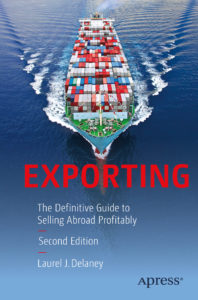
9 Unexpected Reasons to Take Your Business Global
by Laurel J. Delaney
One of the biggest questions I get from small business owners is this: “Why should I take my business global?” What follows are nine unexpected reasons.
1. You can generate greater revenue for less effort.
Sure it takes a long time to seal a deal internationally, but once you do, the revenues are typically far greater than on a domestic deal. For example, let’s say you market gluten-free energy bars. When you ship an order locally to an independent health food store retailer, it might be between four to six cases. If you ship the same product to Austria, for instance, it might be 500 cases. The reason for the difference in the order size is because international customers want to make it worth their while on the shipping cost. The more they order, the lower their per unit shipping cost. Do the math: 500 cases of energy bars, for example, at $60/12-pack case equals a total cost of $30,000. Shipping and everything else included (insurance, tariffs, payment fee, if any) is $2,500, which is $5/case or 8 percent of the transaction cost. If that same customer orders a smaller quantity, the shipping price will rise commensurately against the total order cost.
2. It’s never too late to learn something new in the course of running your business.
Ever hear of the expression “you can’t teach an old dog new tricks?” Whether you are a novice internationalist or a highly seasoned one, it is never too late to learn something new in the course of running your business. Oftentimes, to master something new, it’s a matter of slowing things down, learning the ropes and taking the plunge. In the process, get a little help along the way. You’ve got it here.
3. It’s a cheap, easy way to expand your business.
Are you making 100,000 jars of cherry preserves each year in a manufacturing facility? That tells me you know how to scale your business to some degree. If that is the case, you can easily ramp up and sell more. And just like No. 1, the more you sell, the lower your manufacturing cost will be in this situation, which means you can capture a higher profit margin without losing a customer or competitive edge.
4. It provides evidence you can still turn your business around.
Has your domestic business dried up and people are talking about it? Meaning, the media is reporting, “There’s no more room for local growth for XYZ Company so the only way to expand is international.” Well, what are you waiting for? Everyone likes to see a business be saved by a white knight who takes a business global. Could that be you?
5. You suddenly realize remaining local is holding you back.
If your company is not growing quickly enough, and it needs to move aggressively to break out, going global is the best option. You don’t want to stick to your local knitting at the cost of missing key growth opportunities. You need to take your business and product global.
6. Your inability to stay focused on the business at hand—local.
Just like folks either move or paint a room in their house when they get bored with the same old look, business owners have the tendency to experiment too when things get tedious. As you continue to sell to the same customer base locally and a couple of leads come to you via overseas, try them on for size, meaning attempt to service them and see where it takes your business. I am hoping it’s global.
7. Your local customers are global and want to take you where they are.
Have you found that most of your customers have an international presence or at least global brand recognition? Having references or key introductions from these companies will make it much easier for you to get a foot in the door with overseas customers.
8. Doing business with people worldwide is way cooler than selling to the guy or gal next door.
Here’s the cool factor test: You are at a cocktail party and someone asks you about your San Diego-based business. You respond with, “We sell artistic brooms throughout the San Diego market. Some of our best customers who run hardware stores down the block pick up their orders from our facility.” Now, let’s try this again after you take up selling to the world. “My company sells artistic brooms all over the planet. Customers in Ireland, Brazil and Yugoslavia, for example, not only buy our brooms but talk us up on social media platforms and visit us in person when they want a lesson on how a company makes the best brooms in the world!”
9. Going global has never felt so good.
Your new best friend who you met at the local gym just happens to be an expert in expanding a business internationally and loves the idea of being strategic instead of reactive in helping you take your business global. It can’t hurt that you absolutely adore hanging out with this person, too. Going global has never felt or looked as good as it does now. Let’s go!
Laurel Delaney is the founder of GlobeTrade.com (http://www.globetrade.com), creator of the Global Small Business Blog (http://www.globalsmallbusinessblog.com), Director of the Global Small Business Forum (http://www.globalsmallbusinessforum.com — register for 10/20/17 event in Chicago!), President of Women Entrepreneurs GROW Global (http://www.womenentrepreneursGROWglobal.org), and author of the best-selling, “Exporting: The Definitive Guide to Selling Abroad Profitably (2nd edition, 2016) (https://www.amazon.com/Exporting-Definitive-Selling-Abroad-Profitably/dp/1484221923/). You can find her on Facebook (https://www.facebook.com/LaurelDelaney), Twitter (https://twitter.com/laureldelaney), Google+ (https://plus.google.com/+LaurelDelaney), Pinterest (https://www.pinterest.com/laureldelaney/pins/) and LinkedIn (https://www.linkedin.com/in/laureldelaney).




 There are more than 8 billion potential customers in the world looking for your product or service. Are you ready to serve them?
There are more than 8 billion potential customers in the world looking for your product or service. Are you ready to serve them?